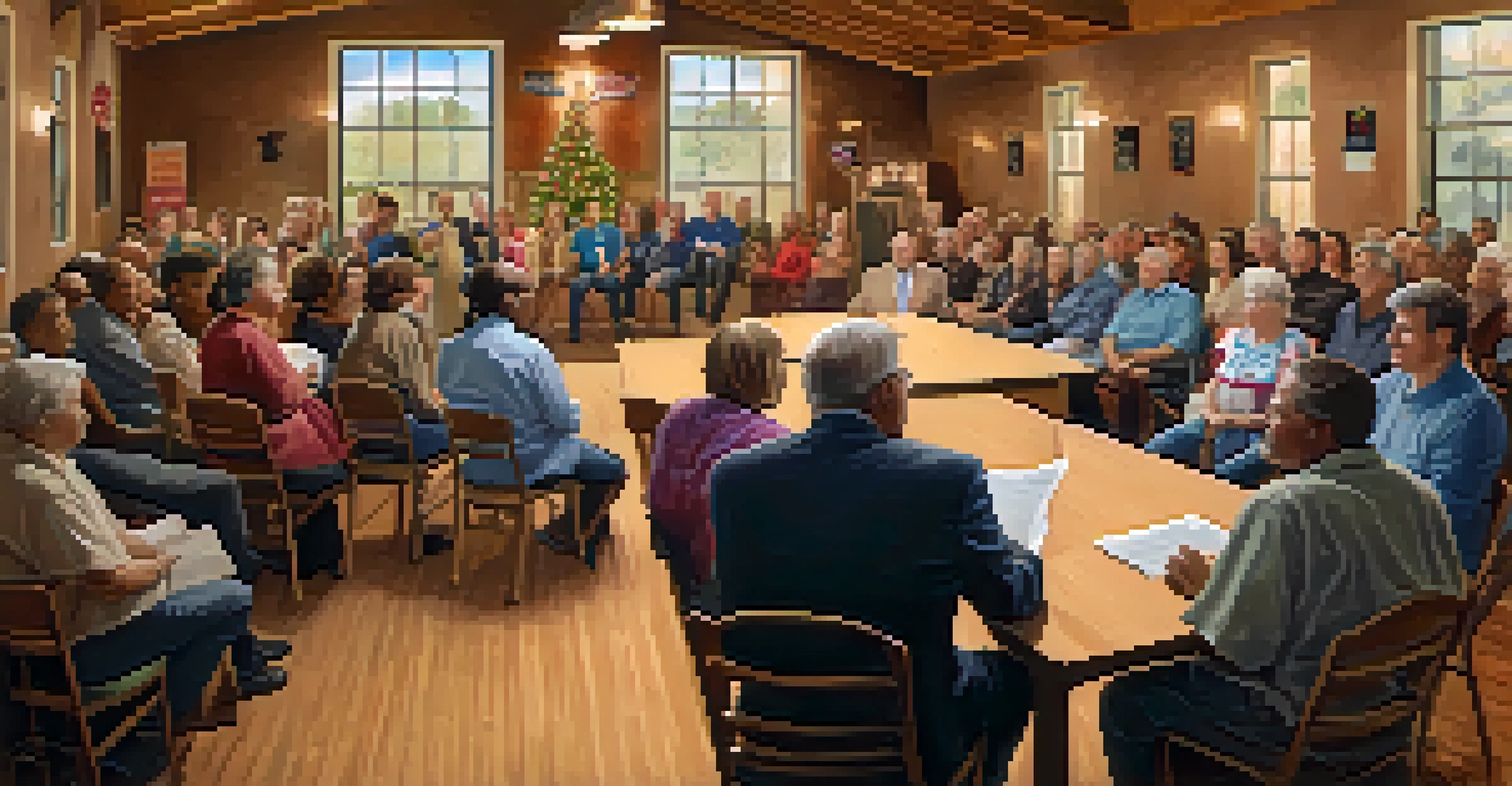Political Campaigns in Texas: Strategies and Outcomes

Overview of Political Campaigns in Texas
Political campaigns in Texas are as vast and diverse as the state itself. With a complex mix of urban and rural areas, candidates must tailor their strategies to resonate with various demographics. From bustling cities like Houston to quiet towns in West Texas, understanding the unique needs of each community is crucial for success.
In Texas, political campaigns are a reflection of our diverse communities, requiring candidates to engage deeply with the unique needs of each demographic.
The political landscape in Texas has evolved, especially with the increasing influence of Latino voters and younger generations. Campaigns now focus on issues such as healthcare, education, and immigration, which reflect the concerns of these growing populations. This shift necessitates innovative approaches to outreach and engagement.
Moreover, Texas is known for its vibrant grassroots movements, which can significantly impact campaigns. These local efforts often mobilize communities and create a sense of urgency around key issues, making it essential for candidates to connect with these grassroots organizations.
Key Strategies for Successful Campaigns
Successful political campaigns in Texas often rely on a combination of traditional and digital strategies. While door-to-door canvassing remains effective, social media platforms have transformed the way candidates communicate with voters. These platforms allow for real-time interaction and the ability to address concerns promptly.

Fundraising is another critical strategy, especially in a state with high campaign costs. Candidates must cultivate relationships with major donors while also tapping into small-dollar contributions from grassroots supporters. This financial backing can make or break a campaign, enabling candidates to invest in advertising and outreach.
Diverse Strategies for Texas Campaigns
Successful political campaigns in Texas require a blend of traditional outreach and modern digital strategies to effectively engage varied demographics.
Additionally, data analytics play a significant role in shaping campaign strategies. By analyzing voter behavior and preferences, campaigns can tailor their messaging and target specific demographics more effectively. This data-driven approach not only enhances engagement but also maximizes the impact of campaign resources.
The Role of Media in Political Campaigns
Media coverage is a double-edged sword in Texas political campaigns. On one hand, positive media attention can elevate a candidate's profile and broaden their appeal. On the other hand, negative press can derail a campaign, especially if it gains traction on social media.
Grassroots movements have the power to transform political landscapes, often holding candidates accountable and demanding responsiveness to the electorate.
Candidates must navigate this landscape carefully, often employing media strategists to craft their narratives. By controlling the message and using press releases, interviews, and debates, candidates aim to shape public perception in their favor. This involves not only promoting their policies but also countering misinformation.
Moreover, local news outlets play a vital role in informing voters about candidates and their platforms. Engaging with these outlets and participating in community discussions can enhance a candidate's visibility and credibility, making media a key component of any successful campaign strategy.
Grassroots Movements and Their Impact
Grassroots movements have gained significant traction in Texas, often influencing election outcomes. These movements are typically driven by passionate individuals who mobilize their communities around specific issues, be it education reform or healthcare access. Their ability to galvanize support is often underestimated by traditional campaigns.
Many of these movements utilize social media to spread their messages quickly and effectively. This digital outreach allows for broader engagement, enabling individuals to share information and rally support with ease. As a result, candidates who align themselves with these grassroots efforts often benefit from heightened visibility and voter enthusiasm.
Grassroots Movements Influence Results
Grassroots movements in Texas significantly impact election outcomes by mobilizing communities around specific issues and holding candidates accountable.
Additionally, grassroots movements can serve as a double-check on candidates, holding them accountable to their promises. This pressure can lead to more responsive governance, as elected officials recognize the power of organized constituents. Thus, understanding and engaging with these movements is crucial for any candidate aiming for success.
Voter Outreach Strategies in Texas
Effective voter outreach is essential for any political campaign in Texas. Campaigns must develop tailored strategies to engage diverse groups, including young voters, minorities, and rural communities. This often involves targeted messaging that speaks directly to the concerns of these demographics.
Events such as town halls and community forums allow candidates to connect face-to-face with voters, fostering a sense of trust and engagement. These interactions provide valuable opportunities for candidates to listen to constituents and address their questions and concerns directly.
Moreover, the use of technology in outreach efforts cannot be overlooked. Text messaging campaigns, email newsletters, and online surveys are increasingly popular tools for engaging voters. By leveraging these technologies, campaigns can gather feedback and mobilize supporters more efficiently, adapting their strategies as needed.
The Importance of Debates and Public Forums
Debates and public forums play a pivotal role in shaping the outcomes of political campaigns in Texas. These events provide candidates with a platform to showcase their policies and articulate their vision directly to voters. They also allow for real-time comparisons with opponents, which can sway undecided voters.
However, performing well in debates requires more than just knowledge of policy; it demands effective communication skills and the ability to think on one's feet. Candidates must be prepared to handle tough questions and criticisms while maintaining composure and clarity in their responses.
Debates Shape Candidate Perception
Participating in debates and public forums allows candidates to showcase their policies and connect with voters, which can sway undecided constituents.
Additionally, public forums foster a sense of community engagement, allowing voters to see candidates in action. These interactions can humanize candidates, making them more relatable to constituents. As a result, candidates who actively participate in such events often find themselves gaining an edge in the competitive Texas political landscape.
Analyzing Political Outcomes in Texas Elections
The outcomes of political campaigns in Texas are influenced by a myriad of factors, including voter turnout, campaign strategy, and candidate appeal. Analyzing these outcomes helps to identify trends and shifts in the political landscape, providing valuable insights for future campaigns. For instance, the increase in voter turnout among younger populations indicates a changing dynamic that candidates must recognize.
Furthermore, examining election results can reveal which issues resonated most with voters. Candidates who successfully align their messaging with the priorities of their constituents are more likely to achieve positive outcomes. This underscores the importance of thorough research and understanding of voter sentiment leading up to the election.

Ultimately, the analysis of political outcomes is not just about winning or losing; it's about understanding the evolving needs and desires of Texas voters. By learning from past elections, candidates can refine their strategies and better connect with the electorate, paving the way for future success.